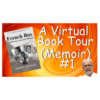
Sit in on this Virtual Memoir Tour
Today, I am urging you to sit back and enjoy this virtual memoir tour in which I read an excerpt read from my memoir French Boy/A 1950s Franco-American Childhood. Here’s some necessary background: I did not learn English until I went to grade school. My brother had preceded me in school where he had learned […]

Monday Focus: Don’t ignore the setting(s) of your story.
Today’s focus reminds you that your stories take place in some context. This is the setting of your story. There are two general sorts of settings. the physical setting that is tangible the abstract setting that consists of family, culture, and the era, etc. This setting tends to be ethereal. Some of the writers I […]

Three Pillars of Starting a Memoir Right Everytime.
DL: this post—Three Pillars of Starting a Memoir Right—introduced a YouTube video which turned out to be the most popular of all my videos. Today, I would like to share both this post and the video. If you haven’t done so already, please share the post and the video and subscribe to my YouTube channel.
_____
Writing a memoir requires a lot of time and energy—but you can do it. You can succeed in writing a memoir. Many people just like you have succeeded in doing so already. Today I am offering you my three pillars of memoir writing.
I want to share a system with you for getting started on writing a memoir. I call it the three pillars of memoir writing.
As with so many projects you might undertake, you can reinvent the wheel or you can plug into a system that has been shown to work. My Memoir Network has been helping people just like you to write personal and family stories since 1988 and our proven system can help you, too, to write a memoir.
The system that I have found to be best for launching new writers—and many practiced writers, too—has three parts to it—three pillars of memoir writing.
1. When writing a memoir, create a memory list. It’s a strong part of the pillars of starting a memoir right
[Free Membership required to read more. See below. ]
We'd love to have you access this content. It's in our members-only area, but you're in luck: becoming a member is easy and it's free.
Already a Member?
Not a Member Yet?

Monday Focus: No stick characters allowed!
Your characters are the people in your life, don’t write them as “stick characters” in your memoir. Write them clearly and forcefully.

Pacing Your Memoir Requires Planning
In almost everything you do in life or in writing, pacing ranks right up there in importance. The tortoise knew how to pace himself and won the race. The hare, on the other hand, needed to view this post before setting out on the race which he eventually lost despite the gift of speed nature […]

Monday Focus: What’s happening in your memoir?
In today’s Monday Focus, we discuss what action/plot readers of your memoir need to keep reading. What makes an action in memoir interesting?

Monday Focus: Theme is the soul of your story.
Understanding “theme” and its role in your memoir is another core task that will both simplify and clarify your message—i.e., your theme.

Another memoir finished: what was the writing process?
Writers can doubt their process. This is understandable as writing a memoir is a long undertaking that can—and usually does—have many discouraging moments.

Monday Focus: Your memoir is not an amoeba: a memoir needs form.
Today is Monday, and it’s a great day to write a bit on your memoir! Your story is not formless; it is not an amoeba. A memoir needs form. You must give your memoir the backbone your readers want and need! Your memoir calls for structure to make as forceful a statement as it can […]
